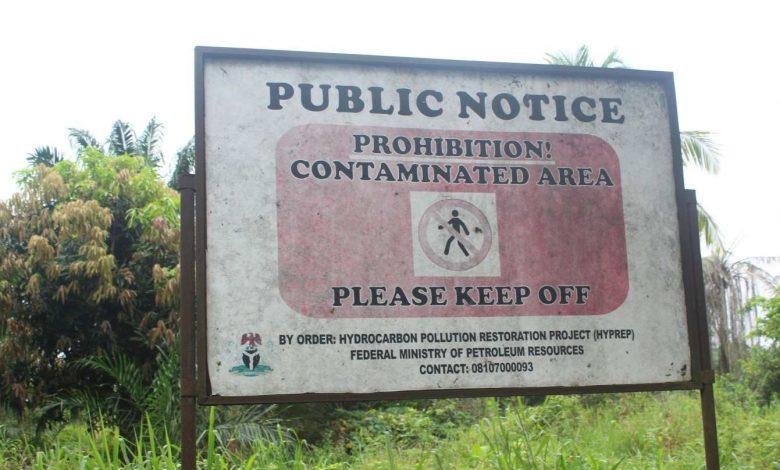HYPREP Not Capable Of Handling Ogoni Cleanup Project, Says UNEP
The UN agency said at the rate it is going, “it will take HYPREP 100 years to utilise its 5-year budget” and complete its assignment.

The United Nations Environmental Programme (UNEP), which assists developing countries to implement environmentally sound policies, has passed a vote of no confidence on the Nigerian agency supervising the Ogoni cleanup project.
The Federal Government launched the project in June, 2016, after many years of hesitancy with the aim of reviving the environment which had been devasted by crude oil exploitation by international oil companies such as Shell.
According to its assessment included in a report released on Thursday, the Hydrocarbon Pollution Remediation Project (HYPREP) is beset with many structural flaws and “is not designed, nor structured, to implement a project as complex and sizable as the Ogoniland clean-up”.
The report, No Clean-Up, No Justice, was published jointly by Amnesty International, Environmental Rights Action/Friends of the Earth Nigeria (ERA/FoEN), Friends of the Earth Europe, and Milieudefensie.
Providing updates to a similar report published in 2014, it evaluated how much progress had been made nine years after UNEP recommended a massive cleanup to remedy the environmental pollution in Ogoniland.
“The findings presented in this report are based on a series of detailed assessments of HYPREP’s performance, produced by UNEP, since early 2019. These documents have not previously been made public.
“Researchers also visited spill sites where HYPREP has appointed contractors to conduct clean-up, reviewed satellite images, photographs and videos of the sites, reviewed publicly available information on HYPREP, and conducted interviews with experts with knowledge of HYPREP’s operations,” the groups explained.
In the executive summary, they said despite UNEP’s recommendations and the launch of the cleanup and restoration programme in 2017, Ogoni people were still waiting endlessly for their communities to be free from oil pollution.
“This is despite hundreds of millions of dollars being transferred to HYPREP by the companies and it spending some thirty million dollars,” the report noted.
In a previously unreleased assessment of HYPREP’s capacity done in February, 2019, the United Nations agency said it would take the implementation agency 100 years to exhaust its five-year budget given its pace of procurement and disbursement.
“There is no overall strategy for HYPREP to achieve its mission of implementing the UNEP report.
“As a result, it is not possible for the various elements of HYPREP (both within, as well as the consultants) to formulate their respective strategies and action plans,” it noted.
In November, 2019, UNEP concluded that HYPREP’s structure was not suitable for a project as sophisticated as the cleanup.
The issues it highlighted included “the absence of a work/implementation plan; severe financial and administrative bottlenecks; a lack of relevant project experience at the level of unit managers; [and] cumbersome Federal Government administrative and financial procedures.”
UNEP also said none of the four privately owned laboratories used by HYPREP had the required accreditation to take on the assignment.
It raised “serious concerns about the quality and reliability of results produced within local laboratories” and urged that the results be treated with caution “until such time as the raft of recommendations is implemented”.
HYPREP suspended the use of two of the laboratories by the end of 2019 after UNEP’s observations were shared with its Governing Council and Board of Trustees.
The report released on Thursday equally called attention to the lack of expertise among consultants and contractors employed by HYPREP as well as potential conflicts of interest between the oil companies and HYPREP, with some senior officials in the latter organisation noted to have links with Shell or the Shell Petroleum Development Company.
“Almost nine years after the publication of the UNEP report this research reveals that there is still no clean-up, no fulfilment of ‘emergency’ measures, no transparency and no accountability for the failed efforts, neither by the oil companies nor by the Nigerian government.
“The efforts that have been made have been too little, too weak and have not resulted in an effective cleanup.
“The government of Nigeria must now drastically step up its ambition to implement in full the recommendations of the 2011 UNEP environmental assessment report for Ogoniland,” the report concluded.
Support Our Journalism
There are millions of ordinary people affected by conflict in Africa whose stories are missing in the mainstream media. HumAngle is determined to tell those challenging and under-reported stories, hoping that the people impacted by these conflicts will find the safety and security they deserve.
To ensure that we continue to provide public service coverage, we have a small favour to ask you. We want you to be part of our journalistic endeavour by contributing a token to us.
Your donation will further promote a robust, free, and independent media.
Donate Here




